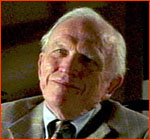
|

|

|
Frank Borman
Frank Borman was Commander of both Gemini 7 and Apollo 8.
On the latter flight, Borman, along with Jim Lovell and Bill
Anders, became the first people to lay eyes on the back side
of the moon.
On Gemini 7:
"Well, the Gemini capsule was about the size of the front
seat of an old Volkswagen Beetle, a little bit smaller than
that."
Well, the Gemini capsule was about the size of the front seat
of an old Volkswagen Beetle, a little bit smaller than that,
and Lovell and I were able to spend two weeks there, basically
because we had had a sense of mission, we wanted to go two
weeks. Also, Lovell's a great guy and very easy to get along
with. So, we made it all right. It was uncomfortable toward
the end when we were out of attitude control fuel, we were
just drifting, rolling through space. The last three days were
very, very long and tiring. Zero G was our greatest friend; it
kept you from getting saddle sores. I think without Zero G, I
don't believe you could've spent two weeks in that place.
On Apollo 8:
"They wanted to know if I thought we could change our
mission and take Apollo 8 and go to the moon. And that's how
it all started."
I got a call to come back and see Slayton now in Houston. And
I went back there and he told me that they had heard from the
CIA that the Soviets were planning a circumlunar flight before
the end of the year. They wanted to know if I thought we could
change our mission and take Apollo 8 and go to the moon. And
that's how it all started. Any idea that the Apollo program
was a great voyage of exploration or scientific endeavor is
nuts. That wasn't the primary mission; the primary mission was
to go to the moon ahead of the Russians and meet the
President's mandate. The real reason that I was in the
program, and the real reason that the program existed, was
because it was a battle in the Cold War, and we started from
behind and we won; it's as simple as that.
On Apollo 8:
"Well, you don't get claustrophobic in my mind because it's
a womb and you're happy in the womb."
It's like a submarine in the respect that everything good is
inside and everything bad is outside. People ask you why don't
you get claustrophobic? Well, you don't get claustrophobic in
my mind because it's a womb and you're happy in the womb. And
everything outside is forbidden.
On Apollo 8:
"And I remember the awe that I had for the people that had
done all those calculations."
One of the things that would tell us if were on track or not
was a certain point in the flight plan, when we'd look down
and see the sunrise impacting the lunar surface. And I
remember the awe that I had for the people that had done all
those calculations. At the exact second we were supposed to
see it, there it was ... It was a clear indication to us that
everything was in good shape.
On the dark side of the moon:
"Well, it was very rough, it was distraught."
Well, it was very rough, it was distraught. I think Jim
described it as looking like dirty beach sand. To me, it
looked more like the burned-out gray ashes of a barbecue. But,
of course, people have been there, you can ask them, and
they'll tell you exactly what it was like. It was a sobering
sight, but it didn't have the impact on me, at least, as the
view of the Earth did.
Back to Hear the Space Pioneers
Photo: NASA
Explore the Moon
|
Lunar Puzzlers
|
Last Man on the Moon
Hear the Space Pioneers
| Origins |
Resources
Transcript
| Site Map |
To the Moon Home
Editor's Picks
|
Previous Sites
|
Join Us/E-mail
|
TV/Web Schedule
About NOVA |
Teachers |
Site Map |
Shop |
Jobs |
Search |
To print
PBS Online |
NOVA Online |
WGBH
©
| Updated November 2000
|
|
|



 Frank Borman
Frank Borman